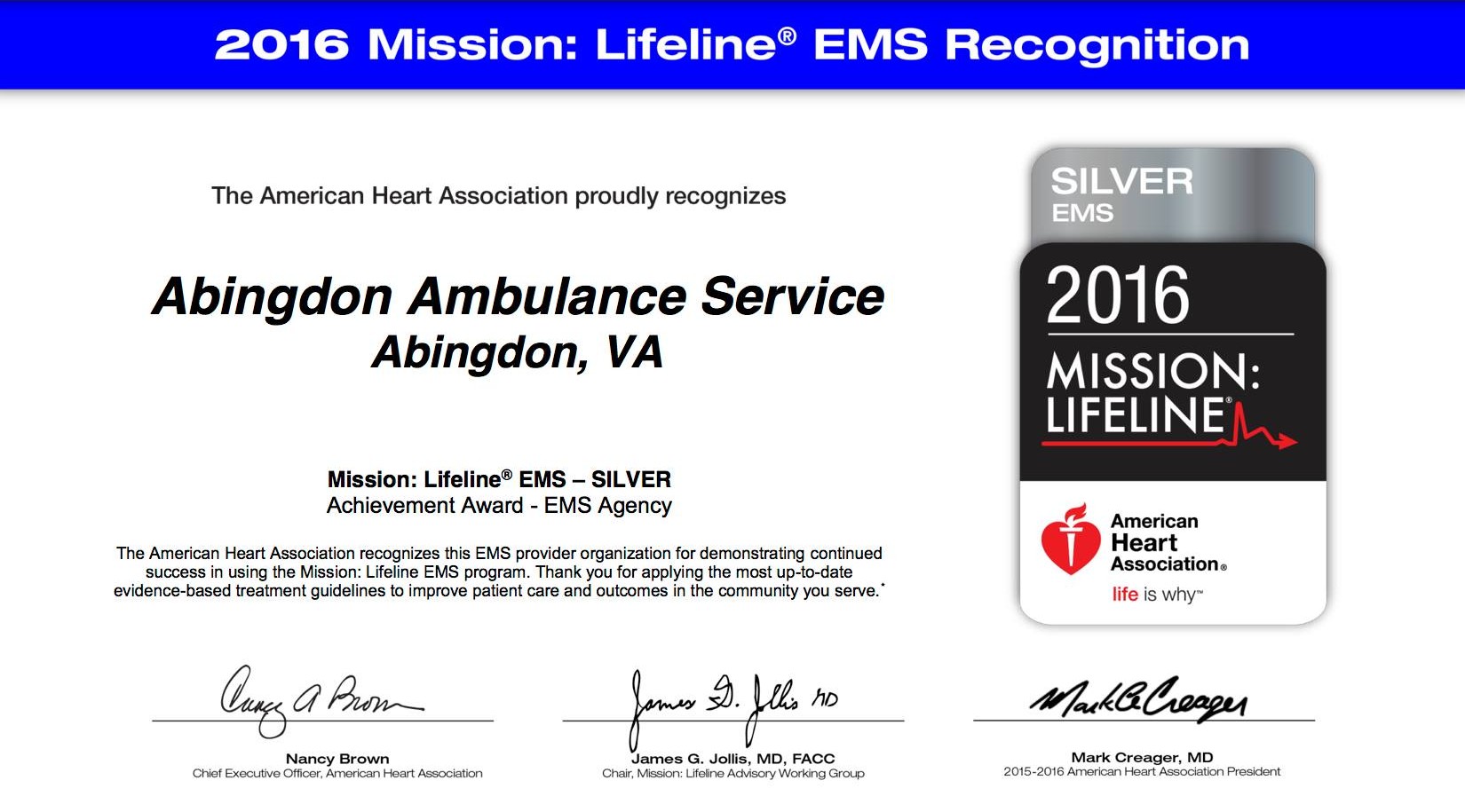Abingdon Ambulance Service receives American Heart Association’s Mission: Lifeline EMS Recognition Award
Abingdon, VA, May 16, 2016 – Abingdon Ambulance Service has received the American Heart Association’s Mission: Lifeline® EMS Silver Award for implementing quality improvement measures for the treatment of patients who experience severe heart attacks.
Every year, more than 250,000 people experience an ST elevation myocardial infarction (STEMI) the deadliest type of heart attack caused by a blockage of blood flow to the heart that requires timely treatment. To prevent death, it’s critical to restore blood flow as quickly as possible, either by mechanically opening the blocked vessel or by providing clot-busting medication.
Unfortunately, a significant number of STEMI patients don’t receive this prompt reperfusion therapy, which is critical in restoring blood flow. Mission: Lifeline seeks to save lives by closing the gaps that separate these patients from timely access to appropriate treatments. Mission: Lifeline’s EMS recognition program recognizes emergency medical services for their efforts in improving systems of care and improving the quality of life for these patients.
Emergency Medical System providers are vital to the success of Mission: Lifeline. EMS agencies perform 12-lead ECGs which measure the electrical activity of the heart and can help determine if a heart attack has occurred. They also follow protocols derived from American Heart Association/American College of Cardiology guidelines. These correct tools, training, and practices allow EMS providers to rapidly identify suspected heart attack patients, promptly notify the medical center, and trigger an early response from the awaiting hospital personnel.
Agencies that receive the Mission: Lifeline Silver award have demonstrated at least 75 percent compliance for each required achievement measure for one year.
“EMTs and paramedics play a vital part in the system of care for those who have heart attacks,” said James Jollis, M.D., Chair of the Mission: Lifeline Advisory Working Group. “Since they often are the first medical point of contact, they can shave precious minutes of life-saving treatment time by activating the emergency response system that alerts hospitals. We applaud Abingdon Ambulance Service for achieving this award that shows it meets evidence-based guidelines in the treatment of people who have severe heart attacks.”
“Abingdon Ambulance Service is dedicated to making our service among the best in the country, and the American Heart Association’s Mission: Lifeline program is helping us accomplish that by implementing processes for improving systems of care with the goal of improving the quality of care for all acute coronary syndrome patients,” said Adrian Lowry, AAS Paramedic & STEMI Program Coordinator. “We are pleased to be recognized for our dedication and achievements in emergency medical care for all cardiac patients.”
AAS is one of 26 emergency medical services throughout Virginia that were recognized with a 2016 Mission Lifeline Award.
About Abingdon Ambulance.
Abingdon Ambulance Service serves patients, hospitals, and other health care facilities across Southwest Virginia and Northeast Tennessee from 6 offices in 5 counties in Virginia. With a fleet of over 20 ambulances and a staff of nearly 100 pre-hospital EMS providers, Abingdon Ambulance Service, A Clifton Company, is among the largest and most capable EMS agencies in the region. AAS provides care and transport of the most critically ill patients between hospitals and has developed the reputation of providing the best in patient care. For more information, visit abingdonambulance.com
About Mission: Lifeline
The American Heart Association’s Mission: Lifeline® program helps hospitals and emergency medical services develop systems of care that follow proven standards and procedures for acute coronary syndrome patients. The program works by mobilizing teams across the continuum of care to implement American Heart Association/American College of Cardiology clinical treatment guidelines. For more information, visit heart.org.

Leave a Reply